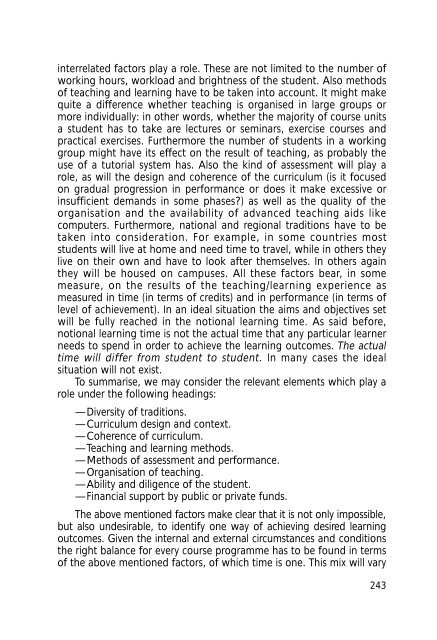Final Report Pilot Project - Relaciones Internacionales de la ...
Final Report Pilot Project - Relaciones Internacionales de la ...
Final Report Pilot Project - Relaciones Internacionales de la ...
Create successful ePaper yourself
Turn your PDF publications into a flip-book with our unique Google optimized e-Paper software.
interre<strong>la</strong>ted factors p<strong>la</strong>y a role. These are not limited to the number of<br />
working hours, workload and brightness of the stu<strong>de</strong>nt. Also methods<br />
of teaching and learning have to be taken into account. It might make<br />
quite a difference whether teaching is organised in <strong>la</strong>rge groups or<br />
more individually: in other words, whether the majority of course units<br />
a stu<strong>de</strong>nt has to take are lectures or seminars, exercise courses and<br />
practical exercises. Furthermore the number of stu<strong>de</strong>nts in a working<br />
group might have its effect on the result of teaching, as probably the<br />
use of a tutorial system has. Also the kind of assessment will p<strong>la</strong>y a<br />
role, as will the <strong>de</strong>sign and coherence of the curriculum (is it focused<br />
on gradual progression in performance or does it make excessive or<br />
insufficient <strong>de</strong>mands in some phases?) as well as the quality of the<br />
organisation and the avai<strong>la</strong>bility of advanced teaching aids like<br />
computers. Furthermore, national and regional traditions have to be<br />
taken into consi<strong>de</strong>ration. For example, in some countries most<br />
stu<strong>de</strong>nts will live at home and need time to travel, while in others they<br />
live on their own and have to look after themselves. In others again<br />
they will be housed on campuses. All these factors bear, in some<br />
measure, on the results of the teaching/learning experience as<br />
measured in time (in terms of credits) and in performance (in terms of<br />
level of achievement). In an i<strong>de</strong>al situation the aims and objectives set<br />
will be fully reached in the notional learning time. As said before,<br />
notional learning time is not the actual time that any particu<strong>la</strong>r learner<br />
needs to spend in or<strong>de</strong>r to achieve the learning outcomes. The actual<br />
time will differ from stu<strong>de</strong>nt to stu<strong>de</strong>nt. In many cases the i<strong>de</strong>al<br />
situation will not exist.<br />
To summarise, we may consi<strong>de</strong>r the relevant elements which p<strong>la</strong>y a<br />
role un<strong>de</strong>r the following headings:<br />
—Diversity of traditions.<br />
—Curriculum <strong>de</strong>sign and context.<br />
—Coherence of curriculum.<br />
—Teaching and learning methods.<br />
—Methods of assessment and performance.<br />
—Organisation of teaching.<br />
—Ability and diligence of the stu<strong>de</strong>nt.<br />
—Financial support by public or private funds.<br />
The above mentioned factors make clear that it is not only impossible,<br />
but also un<strong>de</strong>sirable, to i<strong>de</strong>ntify one way of achieving <strong>de</strong>sired learning<br />
outcomes. Given the internal and external circumstances and conditions<br />
the right ba<strong>la</strong>nce for every course programme has to be found in terms<br />
of the above mentioned factors, of which time is one. This mix will vary<br />
243


